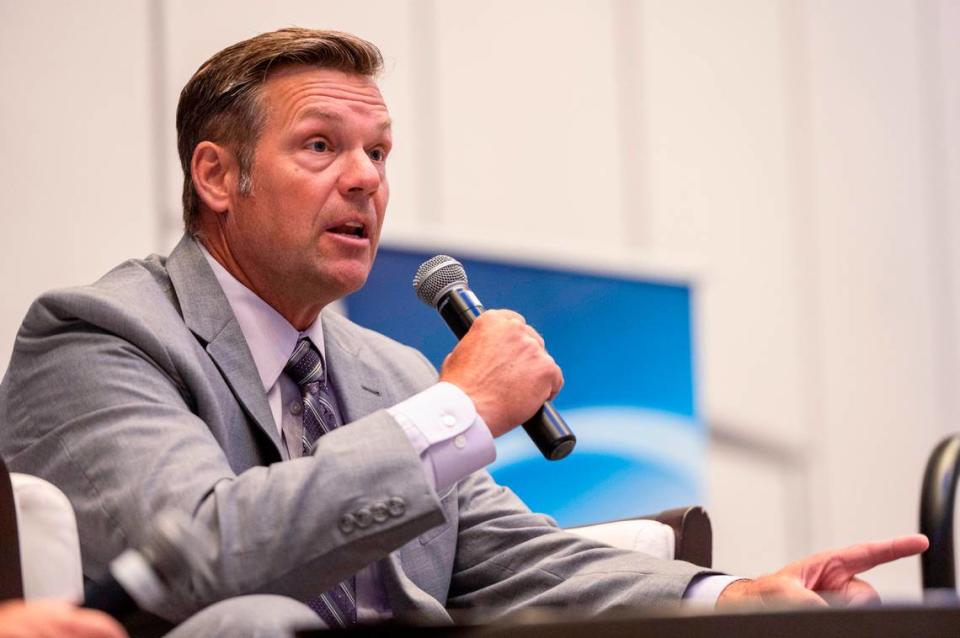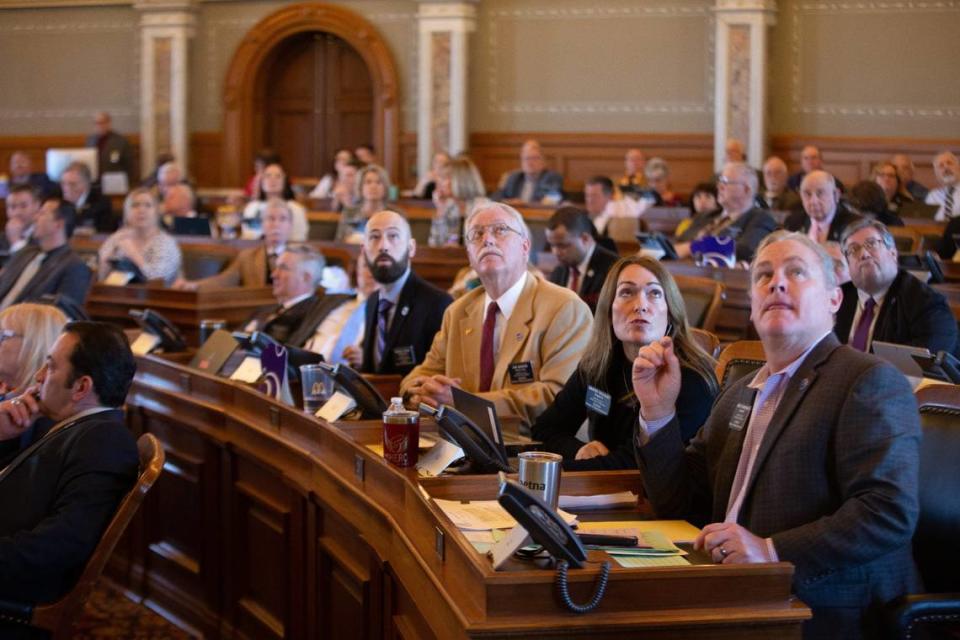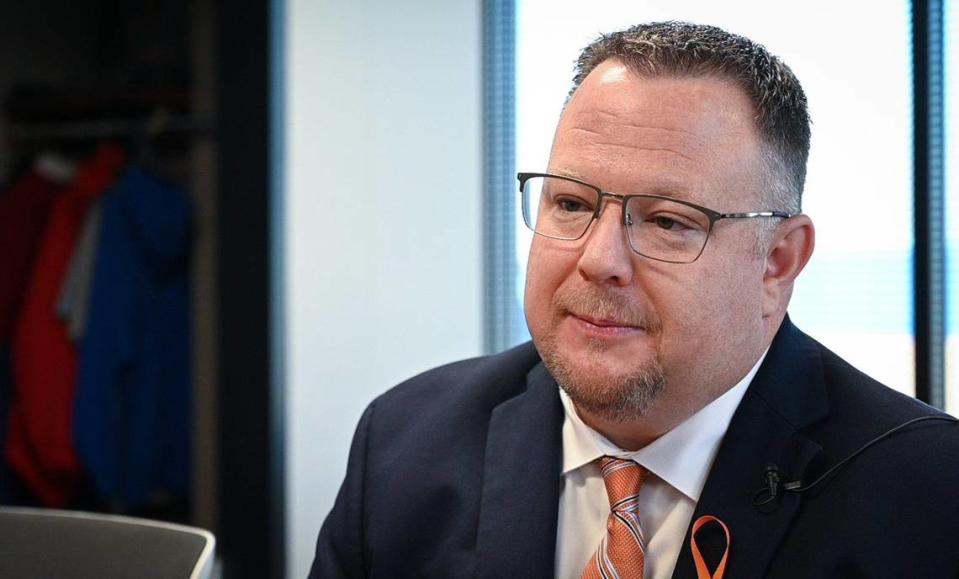Schools, birth certificates: Kris Kobach’s expanding fight against trans rights in Kansas
- Oops!Something went wrong.Please try again later.
When Kris Kobach became Kansas secretary of state 13 years ago, he immediately proposed new election requirements, including showing a photo ID to vote and mandating new voter applicants provide documents proving their citizenship. Among the earliest and fiercest critics of the measure were transgender Kansans.
They warned that confusion or suspicion arising from mismatches between their official documents and outward presentation — and the difficulty of changing official records — risked disenfranchisement. A federal judge later struck down the proof-of-citizenship rule and Kansas agreed to allow transgender residents to change their birth certificates to reflect their gender identities.
But Kobach is set on undoing the accommodations Kansas officials have made for trans residents in recent years. Since becoming the state attorney general a year ago, the Republican has successfully stopped, at least for now, trans residents from easily changing their birth certificates or driver’s licenses.
Kobach is now pushing further, urging school districts to tell parents if students are trans or nonbinary. In a series of letters to districts in December, he cited no specific state law, but wrote that parents have a fundamental constitutional right to direct their children’s education and upbringing.
Kobach rose to prominence for his hardline stances on illegal immigration and embrace of restrictive voting laws. But during more than a decade either holding statewide office or campaigning for it, trans issues have also been a persistent theme of his — and have emerged as a key focus of his tenure as state attorney general.
Micah Kubic, executive director of the American Civil Liberties Union of Kansas, said Kobach has persistently used his power to infringe upon the civil liberties of Kansans across a range of issues, along with using a bully pulpit to impact rights in situations where he does not have official power.
“The pattern with Mr. Kobach has been consistent, that he has pursued these ideological vendettas,” Kubic said. “The folks who he is persecuting change but the pattern remains the same, which is that he uses tools above and beyond his power and he is not content just to stay here in Kansas and do his dirty work.”

The Republican-controlled Legislature last spring passed a bill over Democratic Gov. Laura Kelly’s veto defining man and woman in state law based upon sex assigned at birth. Seizing upon the law, Kobach went to court to undo a 2018 agreement in federal court that required Kansas to allow trans residents to change their birth certificates. He also sued in state court to prevent state officials from allowing trans residents to change the gender markers on their driver’s licenses.
A federal judge dissolved the settlement agreement. And a state district court judge last fall temporarily blocked the driver’s license changes as Kobach’s challenge proceeds.
Before and after taking office, Kobach has also supported restrictions on transgender athletes competing in women and girls’ sports. Lawmakers enacted a ban last year, also over Kelly’s veto.
Then in December, Kobach sent letters to six districts, including Kansas City, Kansas, USD 500, Shawnee Mission USD 512 and Olathe USD 233, that questioned district policies on trans students. The letters asked if the districts had surrendered to “woke gender ideology” in a vaguely threatening tone.
Kobach asked the districts to identify individuals they consulted when drafting their policies and asked the districts to identify any employees who had used different names or pronouns to refer to a student with a parent than they used in the classroom.
Kobach’s office didn’t respond to questions. In public appearances, Kobach has cast his focus on trans issues as taking a stand for reality — at least when it comes to birth certificates. He has also invoked his family in the fight over banning trans athletes.
At the Kansas Republican Party annual convention last month, Kobach promised Kansas would be the first state to challenge anticipated Title IX regulations from President Joe Biden’s administration that could limit Kansas’ ban on trans athletes competing in girls and women’s sports.
He spoke about his 18-year-old daughter who has been offered scholarships to run cross country in college. But, he said, even when she wins the girls’ races boys routinely have faster times. He argued her opportunities would evaporate if laws barring trans athletes from competing were overturned.
“She wouldn’t win, first of all, and secondly she might not get that scholarship because scholarships go to people that can be the top performer on a team,” he said, saying efforts to allow “biological males” to compete with girls constituted a “willful denial of the truth.”

During the same talk at the GOP convention, Kobach also said that he favors people “being free to do what they want to do.”
“You want to dress a certain way, go for it. You want to cut your hair a certain way, go for it. You want to wear makeup or not wear makeup, that’s up to you,” Kobach said. “But don’t deny what happened on a particular day and time which is on the person’s birth certificate. That’s just a historical fact and they’re asking the state to pretend that historical fact didn’t happen.”
But Kobach’s letters to districts, critics say, will keep young trans and nonbinary Kansans from feeling comfortable embracing their gender identity.
Thomas Alonzo, chair of the LGBTQ advocacy group Equality Kansas, said Kobach’s request to schools that they out gender non-conforming students to their parents regardless of the situation is abusive. He recounted his own experience at 12 years old realizing he was gay and being afraid to tell his parents.
Forcing young trans kids to tell their parents when they may not be ready, he said, will result in more suicides and more runaways.
“This is another distraction of Kobach’s, an oppressive distraction that’s being put into place to further intentionally marginalize an already marginalized community,” Alonzo said.
School districts push back on Kobach
Kobach sent letters to six school districts regarding their policies. Two, his office said, changed their policies while four “dug in their heels.”
KCK, Shawnee Mission and Olathe schools each informed Kobach’s office that they worked with trans students and their families on a case-by-case basis.
“While discussion of hypothetical scenarios is not useful in fact-intensive matters such as accommodating transgender students, I want to note that the scenarios presented in your letter are not the types of real-world scenarios that building administrators have to work through,” Shawnee Mission Superintendent Michelle Hubbard wrote in her response.
Olathe Superintendent Brent Yeager criticized Kobach for “inaccurate representations” of the school’s policy and motivations of staff. He offered to meet with Kobach but, according to emails obtained by The Star, the district and the Kansas Attorney General’s Office did not land on a meeting date until after Kobach publicized his concerns.

Atlas Mallams, a 19-year-old trans student at the University of Missouri-Kansas City, said that while his family was supportive when he realized he was trans in high school, that experience is far from universal. The consequences of non-acceptance can be dangerous, he noted, with research showing trans youth have a greater suicide risk than other youth.
Schools should be a safe place for students, regardless of their home situation, where they can both learn and express themselves, Mallams said.
“Now all of a sudden a specific group of people is being told, ‘Well, if you act this way or we think you’re acting this way, we’re going to tell your parents,’” he said.
Rep. Brenda Landwehr, a Wichita Republican who has introduced a bill restricting gender transition surgery for minors, said students transitioning in school is a question of parental rights not transgender rights.
“Since when do parents lose their rights to their kids — to anybody — unless they’ve been abusing them, neglecting them? Then they lose their right to their kid. A school has no right to override a parent’s rights,” Landwehr said.
“In my world, kids don’t have privacy rights.”
Growing national effort
Kobach’s letters are part of a growing Republican effort nationally to require schools to tell parents about students’ gender identity. Five states have laws requiring the outing of trans youth in schools, according to the Movement Advancement Project, a Colorado-based think tank that supports trans rights. An additional six states promote but don’t require schools to out students.
In Kansas, a bill introduced last year would have required schools to refer to students by the pronouns corresponding to their biological sex unless parents granted permission to use other pronouns. The bill died in committee.
While Kobach cited no specific state law in urging districts to drop their policies on transgender students, his reference to the fundamental right of parents potentially lays the groundwork for future legal challenges to the district policies on constitutional grounds.
In 2022, Geary County USD 475 settled for $95,000 a lawsuit brought by a former math teacher. The teacher alleged she had been disciplined after refusing to use students’ preferred pronouns.
The district also had a policy prohibiting teachers from referring to students by their preferred names and pronouns when talking to parents unless they had the student’s permission — a way of stopping teachers from outing students to their parents. Before the settlement, U.S. District Court Judge Holly Teeter, an appointee of former President Donald Trump, ruled that the teacher was likely to prevail on a claim that the policy violated her right to free exercise of religion.
“The Court can envision that a school would have a compelling interest in refusing to disclose information about preferred names or pronouns where there is a particularized and substantiated concern that disclosure to a parent could lead to child abuse, neglect, or some other illegal conduct,” Teeter wrote.
But she went on to write that the district “has not articulated such an interest here — either abstractly or in the case of the specific students in Plaintiff’s class.”
Kobach’s effort to influence school districts fits into an ongoing evolution in how state attorneys general across the country approach their jobs, said Paul Nolette, director of Marquette University’s Les Aspin Center for Government. State attorneys general are “more aggressively partisan” and are using their office in “more inventive ways.”
“This is something that’s been escalating for a while,” said Nolette, who has studied state attorneys general.
House Minority Leader Vic Miller, a Topeka Democrat, said Kobach’s focus on trans issues as attorney general was what he expected when he was elected. Kobach, Miller said, had repeatedly demonstrated his personal biases on the issue.
“When he ran to be elected attorney general he made it very clear he would be sticking his nose into things that aren’t traditionally or conventionally the job of attorney general,” Miller said. “He’s got a lot to do as it relates to crime — I wish he was focused more on what, again, people consider to be traditionally his duties, as opposed to looking for things he can stick his nose in.”

